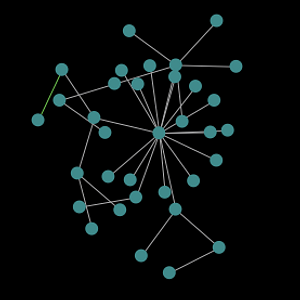- About the Course:
In this re-offering of our popular introductory course, you'll learn about the tools used by scientists to understand complex systems. The topics you'll learn about include dynamics, chaos, fractals, information theory, self-organization, agent-based modeling, and networks. You’ll also get a sense of how these topics fit together to help explain how complexity arises and evolves in nature, society, and technology. There are no prerequisites. You don't need a science or math background to take this introductory course; it simply requires an interest in the field and the willingness to participate in a hands-on approach to the subject.
- About the Instructor(s):
 Melanie Mitchell is Professor of Computer Science at Portland State University, and External Professor and Member of the Science Board at the Santa Fe Institute. She is the author or editor of five books and over 70 scholarly papers in the fields of artificial intelligence, cognitive science, and complex systems. Her most recent book, Complexity: A Guided Tour, published in 2009 by Oxford University Press, won the 2010 Phi Beta Kappa Science Book Award. It was also named by Amazon.com as one of the ten best science books of 2009, and was longlisted for the Royal Society's 2010 book prize.
Melanie Mitchell is Professor of Computer Science at Portland State University, and External Professor and Member of the Science Board at the Santa Fe Institute. She is the author or editor of five books and over 70 scholarly papers in the fields of artificial intelligence, cognitive science, and complex systems. Her most recent book, Complexity: A Guided Tour, published in 2009 by Oxford University Press, won the 2010 Phi Beta Kappa Science Book Award. It was also named by Amazon.com as one of the ten best science books of 2009, and was longlisted for the Royal Society's 2010 book prize.- Course Team:
 Craig Daniels (Teaching Assistant) is in the middle of his Master of Mathematics degree at Portland State University. His coursework to date has focused on abstract math but this year he is focusing on applied math that would be useful in Machine Learning and Data Analysis. He is a founder of a Math Circle, where kids explore deep concepts in Math, at Oregon Museum of Science and Industry and coached MathCounts last year. A long time ago, in a galaxy far far away, he completed a ME in Ocean Engineering and an MBA in Marketing and Finance. He thinks Complexity Theory and the math behind it are exciting and wonderful.
Craig Daniels (Teaching Assistant) is in the middle of his Master of Mathematics degree at Portland State University. His coursework to date has focused on abstract math but this year he is focusing on applied math that would be useful in Machine Learning and Data Analysis. He is a founder of a Math Circle, where kids explore deep concepts in Math, at Oregon Museum of Science and Industry and coached MathCounts last year. A long time ago, in a galaxy far far away, he completed a ME in Ocean Engineering and an MBA in Marketing and Finance. He thinks Complexity Theory and the math behind it are exciting and wonderful. Emily Prouty (Program Assistant) has a background in international development with extensive experience in Latin America and a Masters in Community Development and Action from Vanderbilt University. She is interested in the application of complexity theory to the challenges facing rapidly urbanizing communities abroad.
Emily Prouty (Program Assistant) has a background in international development with extensive experience in Latin America and a Masters in Community Development and Action from Vanderbilt University. She is interested in the application of complexity theory to the challenges facing rapidly urbanizing communities abroad.- Class Introduction:
- Class Introduction
- How to use Complexity Explorer:
- How to use Complexity Explorer
- Enrolled students:
-
4,199
- Course dates:
-
29 Sep 2014 4pm UTC to
31 Dec 2014 7am UTC - Prerequisites:
-
None
- Like this course?
- Donate to help fund more like it
- Twitter link
- Follow Course on Twitter
Syllabus
- What is Complexity?
- Dynamics and Chaos
- Fractals
- Information, Order, and Randomness
- Genetic Algorithms
- Cellular Automata
- Models of Biological Self-Organization
- Models of Cooperation in Social Systems
- Networks
- Scaling in Biology and Society
- Wrapping Up; Virtual Field Trip
